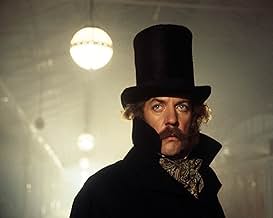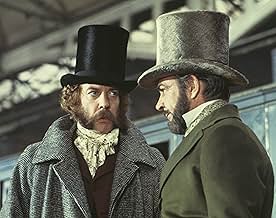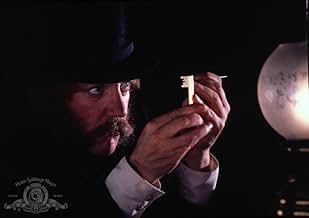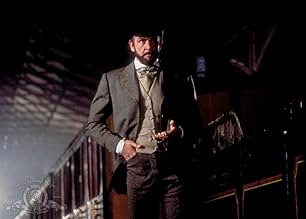England, 1850s. A master criminal aims to rob a train of a large sum of gold. Security is incredibly tight and the task seems an impossible one. However, he has a plan and just the right peo... Read allEngland, 1850s. A master criminal aims to rob a train of a large sum of gold. Security is incredibly tight and the task seems an impossible one. However, he has a plan and just the right people to carry it out.England, 1850s. A master criminal aims to rob a train of a large sum of gold. Security is incredibly tight and the task seems an impossible one. However, he has a plan and just the right people to carry it out.
- Awards
- 1 win & 1 nomination total
- John - Trent's Butler
- (as Brian De Salvo)
- Judge
- (as Andre Morell)
Featured reviews
A delightful period caper picture that's high on production value and fun characterisations. Split into two halves, Crichton's movie makes light of the actual crime to portray Connery and co as lovable rogues, thus hooking the viewer in to actually root for them to pull off the intricate crime. First half (well it's more two thirds of the film to be exact) details how the robbers obtained the four keys needed to get into the safe. Harder than it sounds since they are in different locations to one and other and guarded over by different officials. Naturally there are scrapes, skirmishes and obstacles to overcome during this complex operation, and no short amount of humour and tension either. Then it's on to the actual crime, which buzzes ferociously with derring do and ingenious cheek! It may have been loaded with chitter chatter and much bluffing of the way leading up to it, but the pay off is excellent and not without genuine excitement as Connery's (doing his own stunt work) Pierce and Sutherland's safe cracking Agar pull off the seemingly impossible.
Benefiting the film greatly is Crichton's attention to detail, where he thrives on the Victorian England setting. From the streets, the costumes, the dialogue and mannerisms of the characters, they all fit nicely within the narrative. Helps, too, that the cast are playing it with tongue in cheek, Connery and Sutherland are revelling in playing roguish dandies, splendidly attired facially with quality face fuzz and Down raises the temperature of Connery and male audience members alike. Probably her best ever performance, Crichton writes a good role for Down that sees her not only as a sexy head turner (it's unlikely that Victorian underwear has ever looked this sexy before in film), but also as an observant member of the gang; one who isn't too shabby on the disguise front either. Dancer Wayne Sleep is nicely cast as a fleet footed housebreaker, while Lang, Webb, Morell and Michael Elphick pitch their respective performances just right. Goldsmith's score is energetic and Unsworth's (his last film as he sadly passed away shortly after shooting it) photography is a lesson in quality without trickery.
Fanciful and tame if compared to the big budgeted actioners of today, The First Great Train Robbery none the less is testament that simplicity of plot and a keenness to entertain is sometimes all you need. 8/10
'The First Great Train Robbery' is about the fastest pickpocket you'll ever see, a suave and daring gentleman who never tells the truth It is also about a bunch crooks that can steal your heart with the company of a fascinating disguised mistress who suspects that her father breaks his own regulation for each morning of the shipments...
'The First Great Train Robbery' chronicles the grandeur and hypocrisy at all levels of England during the Victorian Era, and proves that the cleverness and prowess of a criminal mastermind is elevated to heroic status...
With excellent photography of Ireland beautiful countryside, and great music score by Jerry Goldsmith, plus the costumes and sets, Michael Crichton's movie gives train heist's fans the pleasure to enjoy a very entertaining period thriller
The performances are terrific, but the director and the late great Geoffrey Unsworth's delightful photography bring the Victorian Era back to life. The detail is wonderful in all the sets and surroundings.
The plot is very simple, the film is focused and I found myself rooting for the thieves!
What also stands out is the impressive stunts that were done mostly without stuntmen. Wayne Sleep really scales a wall and Sean Connery really walks across the top of a moving train. In today's CGI heavy film industry, it is refreshing to see an older movie that stays simpler with its big stunts, but they feel much realer, because they are. A lot of the movie relies on Sean Connery's natural charisma, which is the secret to a good heist movie, and Connery holds up very well compared to Clooney and Sinatra in the Ocean's movies and Newman and Redford in The Sting.
The first two-thirds of the film is very slow and meticulous. I didn't mind this too much, though I am sure this will lose a lot of viewers. My suggestion is bear with it. First, it is well crafted. Second, the look of VIctorian London is wonderful....so take time to enjoy what you are seeing. The final portion is much more exciting and concerns the robbery itself. It's amazing to see Sean Connery doing his own stunts* and the footage is incredible...and it must have been incredible to see on the big screen.
Overall, a slow and deliberate movie that is great provided you don't mind the pace or that too much of the story is fictionalized in order to make the story more cinematic. The ending, in particular, is pure fiction and the real case, though interesting, is much different.
I do have two further comments. First, the sound on this DVD was abominable...with music that is so much louder than the dialog. You really do need the closed captions in order to watch the film....it's that bad. Second, one mistake I noticed is that the 'gold' in the film was ridiculously lightweight...and seeing Connery and Sutherland EASILY tossing the bags of gold off the train (as if they were filled with newspapers or scones) was silly.
*I know that they touted how Sean Connery did the insane stunt of climbing across the moving train and he clearly did. But in a few scenes, despite the hype, I do strongly suspect that a stuntman was occasionally used...such as when Connery's character is hanging off the sides of the moving train.
Did you know
- TriviaWriter and director Michael Crichton based his book and movie only loosely on the actual crime committed in 1855. In real-life, there were four criminals: Pierce, Agar, the railway guard Burgess and a railway clerk named Tester. All four keys were kept on railway premises, two in London, and two in Folkestone. They were stolen temporarily by Tester and Pierce, respectively, so that Agar could duplicate them, but it turned out that the Folkestone keys were not being used anyway. The guard's van was not locked from the outside; Pierce and Agar were let in by Burgess and a share of the loot was handed out to Tester at stations. None of the criminals were spotted at once; it was several months before the railway conceded that the crime must have occurred on the train. The details came to light after Agar had been convicted in an unrelated crime and his accomplices decided to steal his share instead of using it, as he had asked, to provide his mistress an income. She got word to him and he turned Queen's Evidence against the others and told all. At no point in the case did anyone escape custody.
- GoofsIf the gold shipment was solely to pay British soldiers in Crimea, as asserted, it would have been in the form of barrels of gold coins, not gold bars as shown.
- Quotes
Judge: [Judgementally] Now, on the matter of motive, we ask you: Why did you conceive, plan and execute this dastardly and scandalous crime?
Edward Pierce: I wanted the money.
[the court spectators roar with laughter]
- Crazy creditsCóras Iompair Éireann is misspelled in the end titles with an accent over the 'C' instead of the 'o'.
- Alternate versionsUnder the terms of the Cinematograph Films (Animals) Act 1937 all UK versions of the film are cut by 32 secs with edits to a scene where a dog hunts and kills rats in a show arena ('ratting').
- SoundtracksI Dreamt I Dwelt in Marble Halls
(uncredited)
Music by Michael William Balfe
Lyrics by Alfred Bunn (1843)
Heard on violin offstage in bordello
Details
- Release date
- Country of origin
- Languages
- Also known as
- El gran asalto al tren
- Filming locations
- Cork Kent station, Glanmire Road, Cork, County Cork, Ireland(Brighton station)
- Production companies
- See more company credits at IMDbPro
Box office
- Budget
- $6,000,000 (estimated)
- Gross US & Canada
- $13,027,857
- Opening weekend US & Canada
- $391,942
- Feb 4, 1979
- Gross worldwide
- $13,027,857
- Runtime
- 1h 50m(110 min)
- Color
- Aspect ratio
- 1.85 : 1


































